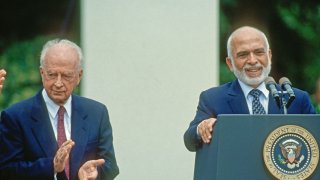30 Years of Israel-Jordan Relations
Despite the recent rancor, the peace treaty between Israel and Jordan continues to deliver invaluable economic and security dividends to both states.
Earlier this month, Jordanian Foreign Minister Ayman Safadi urged the European Union and the United Nations to sanction and embargo arms transfers to Israel. Last week, Jordan’s Muslim Brotherhood—which controls the largest bloc in parliament—claimed that two jihadis who crossed the border to kill Israelis in solidarity with Hamas were members of the organization. All told, this has been an inauspicious run-up to the thirtieth anniversary of the 1994 Jordan-Israel peace agreement.
Since its signing on October 26, 1994, the Wadi Araba Treaty has seen ups and downs. In March 1997, a Jordanian soldier murdered seven Israeli schoolgirls visiting a park on the border known as the Island of Peace. Later that year, several Mossad agents were captured in Amman while attempting to assassinate Hamas leader Khaled Mashal. Since then, on multiple occasions, both Amman and Jerusalem have withdrawn their ambassadors to protest one perceived offense or another. Notwithstanding significant adversity, however, the treaty has endured, and quiet bilateral security cooperation proceeds earnestly.
But the year-long Israel-Hamas war has stressed the relationship considerably. Nearly 60 percent of the kingdom’s population—including Queen Rania—is of Palestinian origin, so it is not surprising that events in Gaza and the West Bank resonate deeply in Jordan. Since October 7, there have been continuous sizable protests in Amman in support of Hamas and a rising popularity of Islamists demanding the cancellation of the peace treaty. During the September parliamentary elections, the Muslim Brotherhood secured thirty-one seats or twenty-two percent of the lower house.
Wadi Araba is not popular in Jordan, but the treaty has benefitted the kingdom enormously. Today, Israel provides parched Jordan with 100 million cubic meters of water per year. Jordan also buys natural gas from Israel. The fifteen-year, $10 billion gas deal supplied about 40 percent of the kingdom’s annual requirement when it was signed in 2016. The treaty also facilitated close and continuing security and intelligence cooperation between the states.
Perhaps most importantly, though, the peace treaty with Israel ended Jordan’s decades-long dalliance with Iraq’s Saddam Hussein and aligned the kingdom with the United States (recall that Jordan’s King Hussein supported Iraq during the first Gulf War in 1991). A free trade agreement and billions of U.S. military and economic assistance ensued. Today, Jordan is the seventh-largest recipient of U.S. foreign aid dollars and the second-largest beneficiary of routine American aid after Israel.
The peace treaty has also been a boon to Israel. Israel secured its longest border and gained strategic depth and early warning vis-à-vis Iran. In recent years, the security partnership has expanded to include integrated missile defense, which in April and early October helped to counter Iranian missile and drone barrages targeting Israel.
Jordan’s peace with Israel, its Western orientation, and its role in blunting these missile attacks have made the kingdom a leading target of Tehran. To destabilize the monarchy, the theocracy and its allies in Damascus have been flooding the kingdom with Captagon and, increasingly, with weapons and explosives. Iran’s proxy militias in Iraq have also threatened to infiltrate the kingdom.
In addition to the growing threat from Iran, the wars in Gaza and Lebanon have taken a heavy toll on the kingdom’s economy. GDP growth has slowed, unemployment is high, foreign direct investment is down, the deficit is rising, and capital expenditures have plummeted. Tourism has also diminished due to the conflict. The mood in the kingdom is particularly dour these days, and much of the frustration is directed at Israel.
While these peace partners share a common enemy in Iran and its so-called “axis of resistance” proxies, the bilateral irritants are proliferating. Beyond Gaza, Amman complains that Israel is changing the “status quo” on the Temple Mount or Haram al-Sharif, violating the “special role” vis-à-vis Muslim Holy sites in Jerusalem afforded to Jordan in the treaty. Likewise, Jordanian officials bristle when Israeli ministers display maps without the kingdom. The palace was infuriated a few years back when Israel stalled a water desalination agreement linking the Red and Dead Seas. For its part, the Government of Israel is furious with Jordan’s incessant post-October-7 criticism and the kingdom’s concerted efforts to isolate the Jewish State diplomatically.
Thirty years after Wadi Araba, the Jordan-Israel relations are at a low point. But the treaty is still operational. To be sure, at the political and popular levels, the ties are cold at best. Yet, at the professional echelons of the state’s military and intelligence agencies, cooperation has never been better. Notwithstanding complaints about the Temple Mount, Israelis and Jordanians continue to work together to prevent outbursts of violence at the Holy Site. This quiet coordination helped ensure a smooth Ramadan in 2023, just six months after the October 7 Attack.
For the foreseeable future, the war in Gaza and its aftermath will remain a point of contention between Israel and Jordan. Despite the rancor, however, the peace continues to deliver invaluable economic and security dividends to the states. With the region on the verge of a military escalation for Jordan, Israel, and the United States, the Wadi Araba treaty is more important than ever.
David Schenker is the Taube Senior Fellow at The Washington Institute and director of the Linda and Tony Rubin Program on Arab Politics. Confirmed by the Senate on June 5, 2019, he served as Assistant Secretary of State for Near Eastern Affairs through January 2021. In that capacity, he was the principal Middle East advisor to the secretary of state and the senior official overseeing the conduct of U.S. policy and diplomacy in a region stretching from Morocco to Iran to Yemen, with responsibility for eighteen countries, the Palestinian Authority, and Western Sahara.
Correction: This article has been updated to reflect the fact that Jordan receives the second-largest amount of routine aid from the United States. 10/28/2024.
Image: Mark Reinstein / Shutterstock.com.

